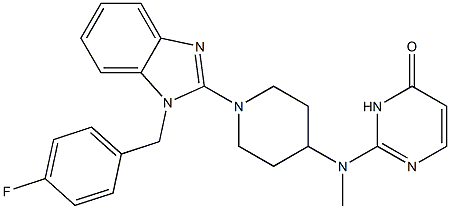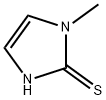Mizolastine , ≥98% , 108612-45-9
CAS NO.:108612-45-9
Empirical Formula: C24H25FN6O
Molecular Weight: 432.49
MDL number: MFCD23140913
EINECS: 1308068-626-2
| Pack Size | Price | Stock | Quantity |
| 200MG | RMB135.20 | In Stock |
|
| 1g | RMB440.80 | In Stock |
|
| 5g | RMB1598.40 | In Stock |
|
| others | Enquire |
PRODUCT Properties
| Melting point: | 217° |
| Density | 1.34±0.1 g/cm3(Predicted) |
| storage temp. | Refrigerator |
| solubility | Chloroform (Slightly, Heated), DMSO, Methanol (Slightly, Heated) |
| form | Solid |
| pka | 9.73±0.40(Predicted) |
| color | White |
| Merck | 14,6221 |
Description and Uses
Mizolastine was marketed in Germany and Switzerland as Mizollen for the symptomatic relief of seasonal and perennial allergic rhinoconjunctivitis and urticaria. Mizolastine is a new long-acting, orally active antihistaminic agent with a rapid onset of action ; the two most recent H1 antagonists launched were fexofenadine, metabolite of terfenadine (Sepracor, 1996) and Olopatadine (Kyowa Hakko, 1997). Mizolastine can be prepared in 2 steps from 2-chloro 1- (4-fluorobenzyl)benzimidazole by successive condensations of appropriate amine and thioether. Mizolastine selectively blocks the peripheral H1 receptors (but not the serotonergic, noradrenergic, muscarinic receptors) with a minimal occupancy of brain receptors, and therefore does not elicit any sedative effects. Moreover, Mizolastine does not produce cardiac rhythm disorders which have been associated with certain non-sedating antihistamines in humans.
A highly selective histamine H1-receptor antagonist (with no anticholinergic, antiadrenergic, or antiserotonin activity) for use in the treatment of allergic disorders, especially rhinitis and urticaria.
Safety
| Symbol(GHS) |  GHS07 |
| Signal word | Warning |
| Hazard statements | H302-H312-H332 |
| Precautionary statements | P280-P302+P352-P312-P322-P363-P501-P261-P271-P304+P340-P312-P264-P270-P301+P312-P330-P501 |
| RTECS | UW7481284 |
| HS Code | 2933.39.9200 |



